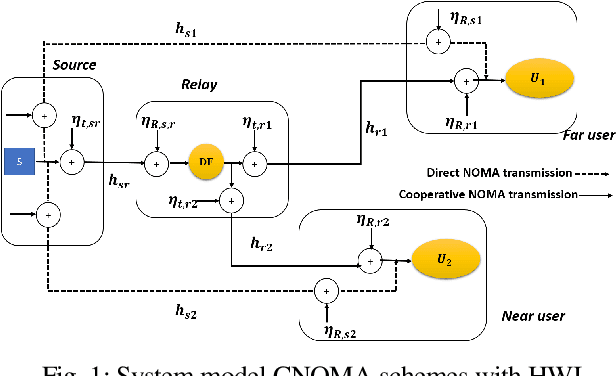Error Analysis of Cooperative NOMA with Practical Constraints: Hardware-Impairment, Imperfect SIC and CSI
Paper and Code
Jul 01, 2022

Non-orthogonal multiple access (NOMA) has been a strong candidate to support massive connectivity in future wireless networks. In this regard, its implementation into cooperative relaying, named cooperative-NOMA (CNOMA), has received tremendous attention by researchers. However, most of the existing CNOMA studies have failed to address practical constraints since they assume ideal conditions. Particularly, error performance of CNOMA schemes with imperfections has not been investigated, yet. In this letter, we provide an analytical framework for error performance of CNOMA schemes under practical assumptions where we take into account imperfect successive interference canceler (SIC), imperfect channel estimation (ICSI), and hardware impairments (HWI) at the transceivers. We derive bit error rate (BER) expressions in CNOMA schemes whether the direct links between source and users exist or not which is, to the best of the authors' knowledge, the first study in the open literature. For comparisons, we also provide BER expression for downlink NOMA with practical constraints which has also not been given in literature, yet. The theoretical BER expressions are validated with computer simulations where the perfect-match is observed. Finally, we discuss the effects of the system parameters (e.g., power allocation, HWI level) on the performance of CNOMA schemes to reveal fruitful insights for the society.
 Add to Chrome
Add to Chrome Add to Firefox
Add to Firefox Add to Edge
Add to Edge